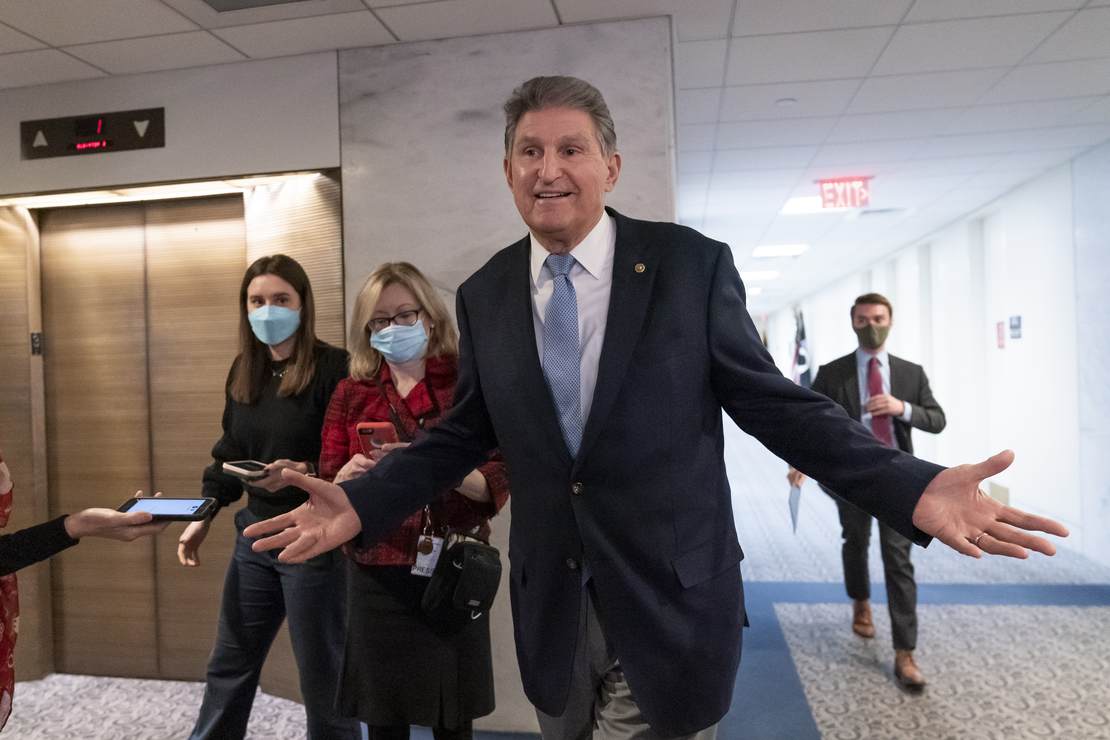
Just remember, as bad as today’s consumer-price index read on inflation is, it could have been worse. One man has stood in the way of Joe Biden’s ambitions to flood the economy with trillions in off-budget government spending even after Biden’s $1.9 trillion American Rescue Plan touched off the worst inflationary wave in 40-plus years. The $5 trillion Build Back Better plan would have acted like a nuclear explosion for inflation.
We all know who kept us from the brink of disaster. Here’s a reminder from last month:
Joe Manchin finally gets the credit he’s due for stopping Biden’s bloated “build back better” spending bonanza from Joe Scarborough and Obama adviser Steve Rattner, of all people. pic.twitter.com/r5hjGuTjtI
— Spencer Brown (@itsSpencerBrown) June 14, 2022
For almost a year now, Chuck Schumer has tried to cut a deal with Joe Manchin to get something passed under reconciliation. The last reported offer was for around $850 billion in spending on climate change and ObamaCare priorities, with $1 trillion in tax hikes to provide Manchin cover for “deficit reduction.” Rumors have swirled for a couple of weeks that the two were close to a deal.
It doesn’t sound that way today:
More cold water from Manchin after inflation report: “No matter what spending aspirations some in Congress may have, it is clear to anyone who visits a grocery store or a gas station that we cannot add any more fuel to this inflation fire.”
— Burgess Everett (@burgessev) July 13, 2022
In fact, Manchin declared 9.1% inflation “a clear and present danger to our economy”:
Centrist Sen. Joe Manchin (D-W.Va.) on Wednesday sounded the alarm after the latest inflation report showed a 9.1 percent jump in prices over the past year, saying that the skyrocketing costs now pose “a clear and present danger to our economy.” …
Manchin on Wednesday said his concerns about rising prices, which Democrats were slow to take seriously, were well-founded.
“For more than a year, leaders in Washington have ignored the serious concerns raised by myself and others about the rising cost of inflation,” he said in a statement.
“No matter what spending aspirations some in Congress may have, it is clear to anyone who visits a grocery store or a gas station that we cannot add any more fuel to this inflation fire,” he added, in a pointed message to fellow Democrats who want to add money to reduce health insurance premiums and raise the cap on state and local tax deductions.
More than one person asked the obvious question after Everett’s initial scoop. How will Manchin be able to explain a vote for even a rump BBB with hundreds of billions in new spending after making a statement like this? The answer: not easily, although Manchin has made similarly categorical statements in the past only to continue negotiating on a reconciliation package of some sort.
But then again, CPI inflation hadn’t hit 9.1%, either. And those statements were predicated on repeated predictions from the Biden administration that inflation had peaked — which later reports showed were entirely based on wishcasting, if not downright horse puckey.
READ RELATED: The Great Realignment: Woke, white progressives are defining the Democratic Party
Does this mean that the BBB has reached the search-through-its-pockets stage rather than being mostly dead? The White House doesn’t think so, and is trying to horse trade away from its horse-puckey status. They’re coughing up some pretty tasty concessions to Manchin too, but those raise serious questions about whether they will lose other Democrats on Capitol Hill as a result:
In the past week and a half, the White House has taken steps that would have been considered unimaginable when President Biden first took office, suggesting that it might greenlight drilling plans in Alaska and the Gulf of Mexico that would produce hundreds of millions more barrels of oil.
Despite violating the president’s climate pledges, officials have opened the door to these proposals as they wait to see if their approval could help finally secure Senate Energy and Natural Resources Committee Chairman Joe Manchin III’s (D-W.Va.) vote for a historic climate package stuck in Congress. Complicating their calculus is that White House aides do not even know if approving them — or Manchin’s other preferred energy projects, such as a pipeline in West Virginia — would bring the elusive senator on board.
The difficult balancing act, described by four administration officials who spoke on the condition of anonymity to avoid jeopardizing a potential deal, is part of the White House’s last-ditch effort to salvage the chances of meeting Biden’s carbon emissions reduction targets with just months until the 2022 midterm elections. The fossil fuel projects may also prove crucial to Democrats’ broader economic package focused on energy, prescription drugs and taxes, since Manchin has so far balked at only approving the new clean energy tax credits that form the core of the party’s climate legislation.
Needless to say, these concessions make the bill almost entirely incoherent. Biden wants to boost the climate-change response by drilling for more oil and building new pipelines? I mean, that’s a first step to an actually rational energy policy, so its’ great if we can pin Biden down on such a concession, but it won’t make the Senate and House progressives happy at all. Can Schumer hold Bernie Sanders, Elizabeth Warren, Maizie Hirono, Ron Wyden, and Patty Murray together on a bill that will open up Alaska and the Gulf to expanded drilling — while delivering weak sauce on their original climate-change objectives?
Perhaps, if Schumer can get Manchin to agree to a couple of sweeteners. But while Manchin still seems to be willing to talk, he’s not willing to offer more spending or tax breaks to the rich. Manchin balks entirely at reinstating the unlimited state and local tax deduction that’s hammering wealth Dem donors, for instance:
Manchin says Northeast Dems insisting on adding SALT to reconciliation bill are barking up the wrong tree: “SALT’s not been in the talks at all.”
— Alex Bolton (@alexanderbolton) July 13, 2022
And forget about that “revenue enhancer” on pass-through S-corps, too:
*MANCHIN SAYS PASS-THROUGH TAX PROVISION NEEDS TO BE ‘SCRUBBED’
— Erik Wasson (@elwasson) July 13, 2022
That proposal created a firestorm of opposition from small business owners who have used S-corp status to handle their combined taxes. Dumping it would probably be a good idea for Democrats in the midterm cycle, as it would anger a lot of grassroots entrepreneurs and force them to raise prices to compensate for the new costs. In fact, Manchin wants to scrub everything except drug pricing on Medicare and some deficit reductions:
So yeah, the parl needs to scrub but Manchin says he does too
— Burgess Everett (@burgessev) July 13, 2022
Manchin appears less to be negotiating than laying down an ultimatum on spending and inflationary tax policies. And well he might, since Manchin has no particular political interest in passing a reconciliation bill at this point, not unless he gets exactly what he wants. Even the energy concessions will have to come eventually, given the dire situation Biden has created for himself economically and strategically on US domestic production.
Source:






